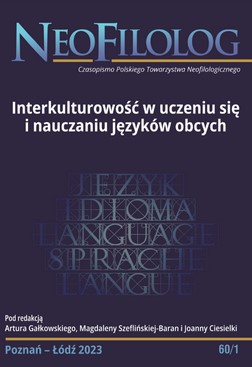Interkulturowa kompetencja komunikacyjna w nauczaniu akcentuacji języka rosyjskiego
Intercultural communication competence in the acquisition of word stress in Russian
Author(s): Joanna WochSubject(s): Lexis, Language acquisition, Comparative Linguistics, Eastern Slavic Languages, Sociology of Culture
Published by: Uniwersytet Adama Mickiewicza
Keywords: intercultural communication competence; Russian language; word stress; colloquial Russian; spoken language; system of accentuation;
Summary/Abstract: Intercultural communicative competence in the acquisition of word stress in Russian refers to the effective and appropriate management of interaction in various conversational situations that require specific orthoepic habits in the area of the contemporary Russian system of accentuation. Every natural communicative situation needs informal, spoken language, rather the standard Russian that is taught in the classroom context. Therefore, the characteristics of word stress in contemporary spoken Russian needs to be examined. Research conducted on a group of Russian, Belorussian and Ukrainian Youtubers indicates that their analyzed speech contains some specific derivatives which are characteristic of colloquial Russian: semelfactive verbs and their past participle forms with stressed suffix -ну́(ть)/-ану́(ть), masculine derivatives with stressed suffix -о́с, neuter nouns with the suffix -ов(о)/-ев(о), masculine nouns with the stressed suffix -а́к/-я́к, -а́н/-я́н, -о́н, feminine nouns with an accented suffix -у́х(а)/-ю́х(а), deverbal nouns with suffix -ёж, diminutives with suffixes -чик, -у́шк(а)/-ю́шк(а), -а́шк(а)/-я́шк(а), relational adjectives with stressed suffix -о́в(ый). Furthermore, there is no significant difference between the Ukrainian, Belorussian and Russian analyzed material in terms of accentuation apart from one tendency, which does not seem to appear in the Russians’ speech. Ukrainians and Belorussians tend to stress the root in short verbs of past tense feminine forms.
Journal: Neofilolog
- Issue Year: 60/2023
- Issue No: 1
- Page Range: 116-129
- Page Count: 14
- Language: Polish

